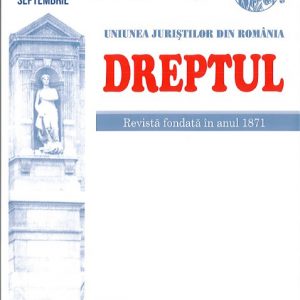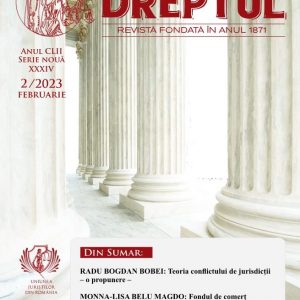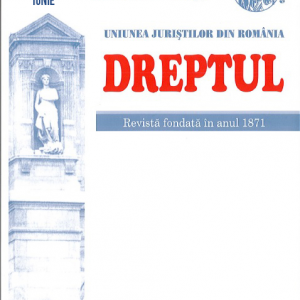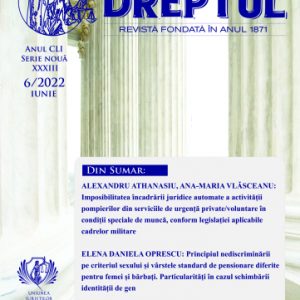-
 The correlation between parliament and democracy is a classical one. It has been proven not only by the beginnings of parliamentarism, related to limitation of the omnipotence of the monarch, but also by subsequent developments, especially in the generalization of universal suffrage, but also by the historical experience of the previous century, when the collapse of totalitarian or authoritarian regimes has always been followed by the return to parliamentarism or to a political system in which Parliament’s role is essential. After joining the European Union, its role was enhanced by its involvement in the European decision-making process.
The correlation between parliament and democracy is a classical one. It has been proven not only by the beginnings of parliamentarism, related to limitation of the omnipotence of the monarch, but also by subsequent developments, especially in the generalization of universal suffrage, but also by the historical experience of the previous century, when the collapse of totalitarian or authoritarian regimes has always been followed by the return to parliamentarism or to a political system in which Parliament’s role is essential. After joining the European Union, its role was enhanced by its involvement in the European decision-making process. -
 The attributions that confer substance to the activity of the prosecutor before the jurisdictional body are the participation in the trial of the criminal and civil cases, the exercise of the means of appeal against the judgments, the examination of the cases of non-uniform application of the law and the analysis of the cases in which the courts have delivered final judgments of acquittal, return or referral to the prosecutor. In criminal matters, the prosecutor mandatorily participates in the trial, under the sanction of absolute nullity, in the cases where the law expressly provides for his participation, and optionally, in cases other than those in which the law establishes the obligativity of participation. In civil matters, the rule is that the prosecutor takes part in the trial optionally, when he considers it necessary to defend the rule of law, the rights and interests of citizens. By way of exception, the prosecutor mandatorily participates in the trial of the civil cases when the obligativity is expressly provided. In criminal matters, the law opens for the prosecutor the path to exercise all means of appeal, ordinary (appeal, contestation) or extraordinary (recourse in cassation, contestation for annulment, revision), against various judgments. In civil matters, the prosecutor may exercise the means of appeal when he deems it is necessary to protect the rights and legitimate interests of minors, of the persons placed under interdiction and of the missing persons, or when he has participated in the trial of the case.
The attributions that confer substance to the activity of the prosecutor before the jurisdictional body are the participation in the trial of the criminal and civil cases, the exercise of the means of appeal against the judgments, the examination of the cases of non-uniform application of the law and the analysis of the cases in which the courts have delivered final judgments of acquittal, return or referral to the prosecutor. In criminal matters, the prosecutor mandatorily participates in the trial, under the sanction of absolute nullity, in the cases where the law expressly provides for his participation, and optionally, in cases other than those in which the law establishes the obligativity of participation. In civil matters, the rule is that the prosecutor takes part in the trial optionally, when he considers it necessary to defend the rule of law, the rights and interests of citizens. By way of exception, the prosecutor mandatorily participates in the trial of the civil cases when the obligativity is expressly provided. In criminal matters, the law opens for the prosecutor the path to exercise all means of appeal, ordinary (appeal, contestation) or extraordinary (recourse in cassation, contestation for annulment, revision), against various judgments. In civil matters, the prosecutor may exercise the means of appeal when he deems it is necessary to protect the rights and legitimate interests of minors, of the persons placed under interdiction and of the missing persons, or when he has participated in the trial of the case. -
 Are separate opinions necessary? Writing them involves both time and resources, and the result does not influence the causes in which they were formulated. In this context, the logical question is why some national and international judges choose to formulate such opinions. We appreciate that the main reason is the potential of these opinions to contribute to the development of the future judicial practice. The aim of this study is to emphasize the importance and benefits of regulating the separate opinions in national legislation and to encourage their use. In this study we aim to analyze the purpose of the separate opinions along with the arguments for and against their regulation in national legislations. We will also analyze the difference between separate and concurring opinions, but also the different result that these opinions may have. We will also address the issue of the style in which these opinions are written and the impact it may have on future case law. A distinct part of this paper will be devoted to the analysis of separate opinions in national courts. At the same time, we will follow if there are differences between the constitutional court and the common law courts, regarding the use of these opinions. At the end of the study, we will make some proposals de lege ferenda on the need for legislative development of the field of separate and concurring opinions, development which would encourage their use and, at the same time, would limit the purpose of using these opinions to the development of the case law.
Are separate opinions necessary? Writing them involves both time and resources, and the result does not influence the causes in which they were formulated. In this context, the logical question is why some national and international judges choose to formulate such opinions. We appreciate that the main reason is the potential of these opinions to contribute to the development of the future judicial practice. The aim of this study is to emphasize the importance and benefits of regulating the separate opinions in national legislation and to encourage their use. In this study we aim to analyze the purpose of the separate opinions along with the arguments for and against their regulation in national legislations. We will also analyze the difference between separate and concurring opinions, but also the different result that these opinions may have. We will also address the issue of the style in which these opinions are written and the impact it may have on future case law. A distinct part of this paper will be devoted to the analysis of separate opinions in national courts. At the same time, we will follow if there are differences between the constitutional court and the common law courts, regarding the use of these opinions. At the end of the study, we will make some proposals de lege ferenda on the need for legislative development of the field of separate and concurring opinions, development which would encourage their use and, at the same time, would limit the purpose of using these opinions to the development of the case law. -
 In this study, the author explains the concepts of: structure of the registered capital; general pledge of the creditors; registered capital; difference between the registered capital and the patrimony of the company; difference between the registered capital and the equity capital (net assets); difference between the registered capital and the value of the company, as well as the problems of the legal regime of social contributions after payments, as all of the above follow from the Law No 31/1990 (republished) on companies.
In this study, the author explains the concepts of: structure of the registered capital; general pledge of the creditors; registered capital; difference between the registered capital and the patrimony of the company; difference between the registered capital and the equity capital (net assets); difference between the registered capital and the value of the company, as well as the problems of the legal regime of social contributions after payments, as all of the above follow from the Law No 31/1990 (republished) on companies. -
 In the practice of the courts in our country the punishment imposed for the offence of unintentional killing is, in most cases, imprisonment with suspended execution, even in the situations where the guilt rests solely on the offender or when there are several victims, a fact which can call into question the manner in which the principles governing the individualization of punishments are implemented, whereas, by imposing excessively lenient punishments, in relation to the seriousness of the facts, the desideratum concerning the educational and preventive role thereof is not achieved.
In the practice of the courts in our country the punishment imposed for the offence of unintentional killing is, in most cases, imprisonment with suspended execution, even in the situations where the guilt rests solely on the offender or when there are several victims, a fact which can call into question the manner in which the principles governing the individualization of punishments are implemented, whereas, by imposing excessively lenient punishments, in relation to the seriousness of the facts, the desideratum concerning the educational and preventive role thereof is not achieved. -
 The voting right of the shareholder at the general meeting of the shareholders is an accessory right to the ownership of the shares, by which the shareholder protects his interests and exercises the supervision and control over the management of the company. It is a true prerogative of the shareholder’s access to the substantiation of business decisions, which materialize through the will of the company. The exercise of the right to vote is governed by the principle of good faith and the principle of proportionality, but may be limited in the situation of the conflict of interests between the shareholder and the company. The shareholder in conflict of interests with the company is obliged to abstain from the vote, if by his vote it contributes to the formation of the majority of a decision with harmful consequences for the company. The situation of conflict of interests and the sanction of non-observance of the obligation to abstain from voting cannot be determined by the other shareholders, but only by the court. If, through the decision adopted with the participation of the shareholder in conflict of interests, a prejudice has occurred, the applicable sanction is the commitment of its liability. Such a decision is valid, but it can also be cancelled, provided that it is the result of a majority abuse. The same fate has the decision adopted by the minority shareholders with the abusive removal of the shareholder’s vote supposed to be in conflict of interests.
The voting right of the shareholder at the general meeting of the shareholders is an accessory right to the ownership of the shares, by which the shareholder protects his interests and exercises the supervision and control over the management of the company. It is a true prerogative of the shareholder’s access to the substantiation of business decisions, which materialize through the will of the company. The exercise of the right to vote is governed by the principle of good faith and the principle of proportionality, but may be limited in the situation of the conflict of interests between the shareholder and the company. The shareholder in conflict of interests with the company is obliged to abstain from the vote, if by his vote it contributes to the formation of the majority of a decision with harmful consequences for the company. The situation of conflict of interests and the sanction of non-observance of the obligation to abstain from voting cannot be determined by the other shareholders, but only by the court. If, through the decision adopted with the participation of the shareholder in conflict of interests, a prejudice has occurred, the applicable sanction is the commitment of its liability. Such a decision is valid, but it can also be cancelled, provided that it is the result of a majority abuse. The same fate has the decision adopted by the minority shareholders with the abusive removal of the shareholder’s vote supposed to be in conflict of interests. -
 The article proposes a sensitive topic in the Romanian criminal procedure, namely to determine the extent to which the cases of absolute nullity are limitatively provided by the Criminal Procedure Code (Article 281 of the Criminal Procedure Code) or whether there are cases of nullity of the processual or procedural documents which, although not included in the enumeration of Article 281 of the Criminal Procedure Code, are, however, veritable cases of absolute nullity. The problem is all the more delicate since the national doctrine is situated, up to this moment, in the comfort zone in which the cases of absolute nullity are equated to those of express nullity and those of relative nullity to those of virtual nullity. I have shown, with examples from the practice, but also from the doctrine (too timid so far), that there are situations of virtual absolute nullity of the criminal processual acts not even listed in the content of Article 281 of the Criminal Procedure Code, as well as the situations in which they may become incidental.
The article proposes a sensitive topic in the Romanian criminal procedure, namely to determine the extent to which the cases of absolute nullity are limitatively provided by the Criminal Procedure Code (Article 281 of the Criminal Procedure Code) or whether there are cases of nullity of the processual or procedural documents which, although not included in the enumeration of Article 281 of the Criminal Procedure Code, are, however, veritable cases of absolute nullity. The problem is all the more delicate since the national doctrine is situated, up to this moment, in the comfort zone in which the cases of absolute nullity are equated to those of express nullity and those of relative nullity to those of virtual nullity. I have shown, with examples from the practice, but also from the doctrine (too timid so far), that there are situations of virtual absolute nullity of the criminal processual acts not even listed in the content of Article 281 of the Criminal Procedure Code, as well as the situations in which they may become incidental. -

-
 As expected, sanctions and solutions covered by the Code of Civil Procedure of 1865 were taken over by Law no. 134/2010 regarding the Code of Civil Procedure (republished) entering into force on February 1, 2013. In this regard, fines, voidness, decay, obsolescence, application rejection or accept are regulated. The latest law also establishes new sanctions and solutions, some of them unusual: closing the case, out of trial, trial settlement, ignoring, remaining ineffective.
As expected, sanctions and solutions covered by the Code of Civil Procedure of 1865 were taken over by Law no. 134/2010 regarding the Code of Civil Procedure (republished) entering into force on February 1, 2013. In this regard, fines, voidness, decay, obsolescence, application rejection or accept are regulated. The latest law also establishes new sanctions and solutions, some of them unusual: closing the case, out of trial, trial settlement, ignoring, remaining ineffective. -
 Recent legislative interventions have brought important innovations on mediation, and one of them has promoted the sanction of dismissing the claim as inadmissible in case of claimant’s failure to observe the obligation to participate in the briefing on the advantages of mediation. The author determines the conditions for applying this procedural sanction, which he considers extremely severe and even excessive. Inadmissibility for not participating in the briefing is being also examined in the light of the provisions of art. 21 of the Romanian Constitution, regarding the free access to justice and the provisions of art. 6 of the (European) Convention on Human Rights and Fundamental Freedoms. Secondly, the author notes that the sanction of inadmissibility applies only to the claimant. He believes, however, that the respondent may be subject to a judicial fine should he/she fail to appear in the briefing, according to Art. 187 item 1 letter f) of the new (Romanian) Code of Civil Procedure entered into force on February 15, 2013.
Recent legislative interventions have brought important innovations on mediation, and one of them has promoted the sanction of dismissing the claim as inadmissible in case of claimant’s failure to observe the obligation to participate in the briefing on the advantages of mediation. The author determines the conditions for applying this procedural sanction, which he considers extremely severe and even excessive. Inadmissibility for not participating in the briefing is being also examined in the light of the provisions of art. 21 of the Romanian Constitution, regarding the free access to justice and the provisions of art. 6 of the (European) Convention on Human Rights and Fundamental Freedoms. Secondly, the author notes that the sanction of inadmissibility applies only to the claimant. He believes, however, that the respondent may be subject to a judicial fine should he/she fail to appear in the briefing, according to Art. 187 item 1 letter f) of the new (Romanian) Code of Civil Procedure entered into force on February 15, 2013. -
 In this study, by an inductive method, we will try to address the problem, the solution and the arguments that could be found in certain situations where there is a disagreement between the category of use of a land classified as forest and its actual legal situation, disagreement which unreasonably generates limitations of the right to build on the land in question. In case a land has mentioned in the title of property the category of use „Forest” (Pd), but this land does not actually meet the legal conditions provided by Articles 1, 2, 19 (1) and Article 20 (2) of the Law No 46/2008 on the Forest Code in order to be considered forest, in order to be part of the national forest fund and in order to be mandatorily subject to the regime of a forest arrangement, then this land must be considered only a land with forest vegetation outside the national forest fund or a simple land not subject in any way to the provisions of the Law No 46/2008 on the Forest Code, for which it is possible to request the change of the category of use according to Article 24 (1) and (2) of the Law No 46/2008 on the Forest Code.
In this study, by an inductive method, we will try to address the problem, the solution and the arguments that could be found in certain situations where there is a disagreement between the category of use of a land classified as forest and its actual legal situation, disagreement which unreasonably generates limitations of the right to build on the land in question. In case a land has mentioned in the title of property the category of use „Forest” (Pd), but this land does not actually meet the legal conditions provided by Articles 1, 2, 19 (1) and Article 20 (2) of the Law No 46/2008 on the Forest Code in order to be considered forest, in order to be part of the national forest fund and in order to be mandatorily subject to the regime of a forest arrangement, then this land must be considered only a land with forest vegetation outside the national forest fund or a simple land not subject in any way to the provisions of the Law No 46/2008 on the Forest Code, for which it is possible to request the change of the category of use according to Article 24 (1) and (2) of the Law No 46/2008 on the Forest Code. -

